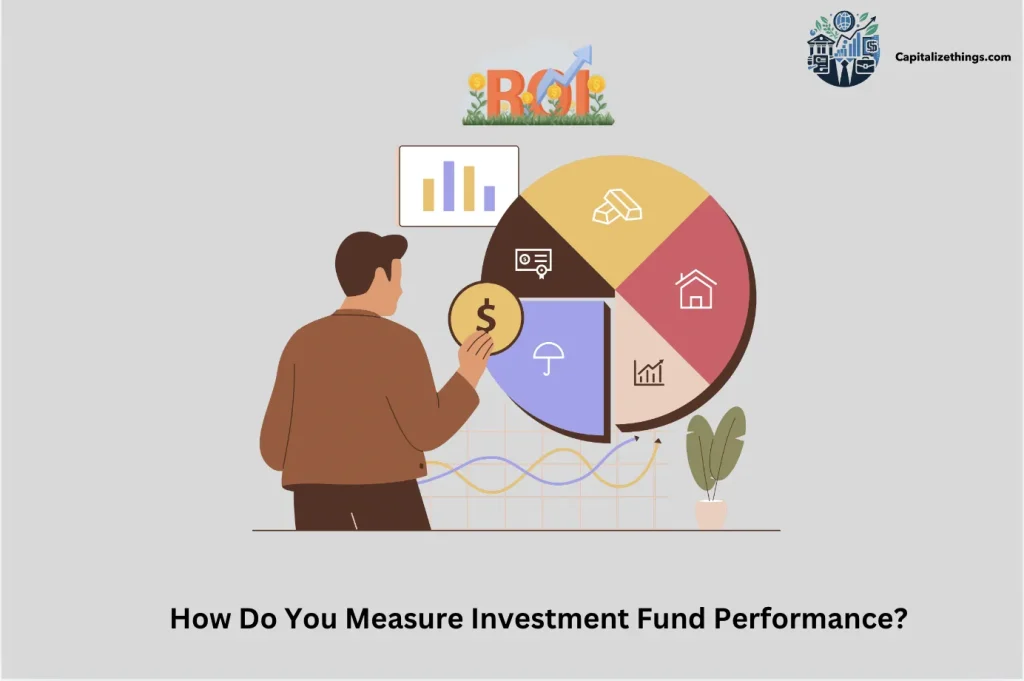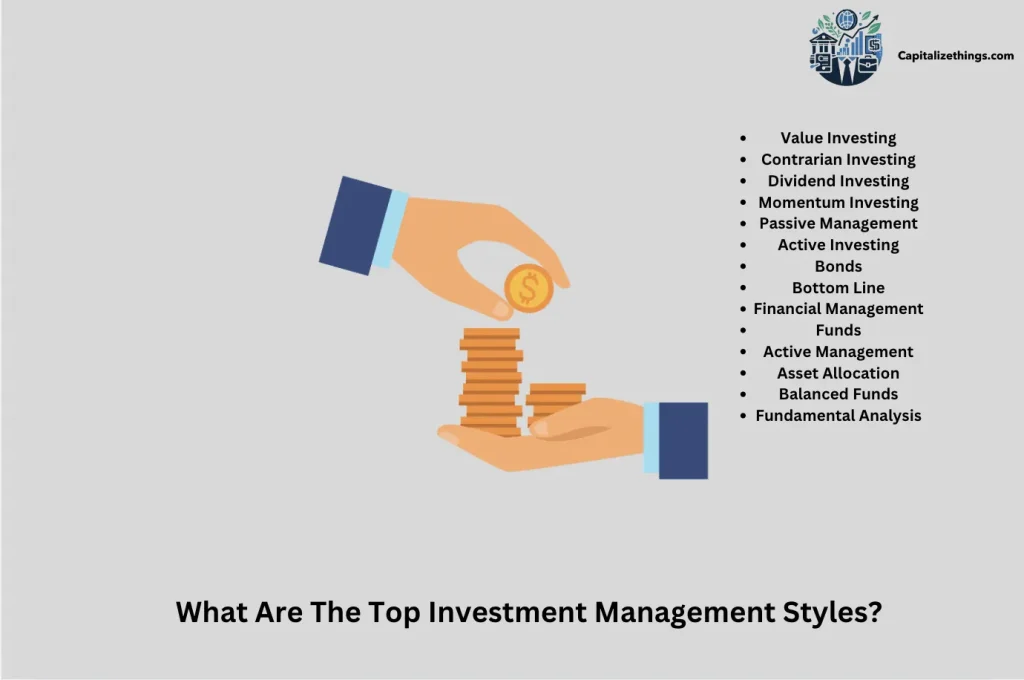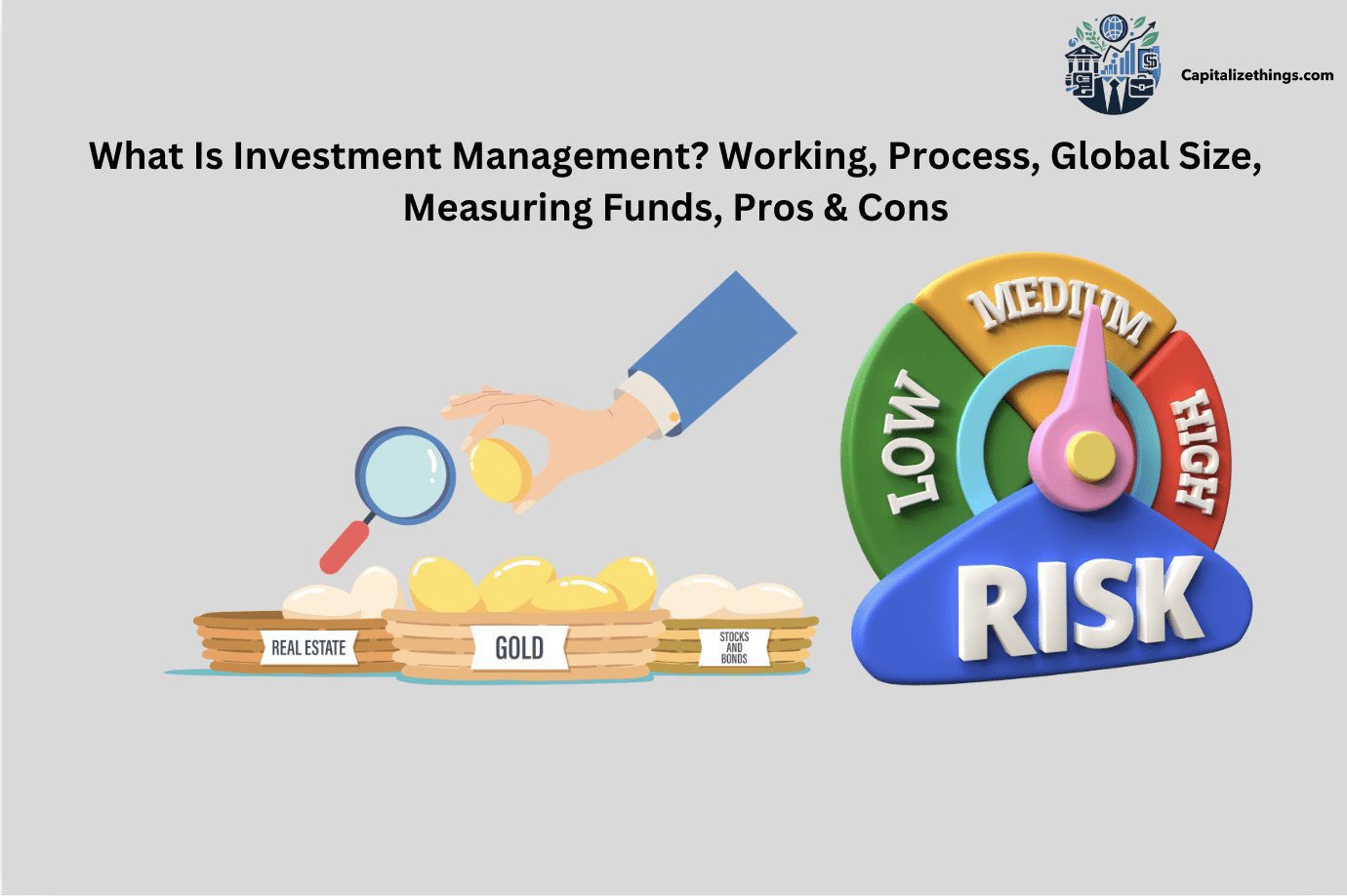Investment management is the professional handling of various financial securities and assets to achieve specific investment goals. It involves analyzing markets, selecting investments, and managing portfolios. Investment managers make strategic decisions on behalf of clients, including individuals, companies, and institutions, to grow their assets while minimizing risks. The process includes asset allocation, financial analysis, and ongoing monitoring to ensure portfolios align with clients’ objectives. The investment management process starts with understanding the client’s financial goals and risk tolerance. It includes developing an investment strategy, selecting suitable assets, and implementing the strategy by buying or selling investments. Continuous monitoring and performance assessment are essential to adjust portfolios based on market conditions or changes in client needs. The process ensures that the investment strategy stays aligned with the client’s goals.
The global investment management industry is enormous, managing assets worth over $120 trillion as of 2024. This industry includes various players such as mutual funds, pension funds, and hedge funds. North America, Europe, and Asia dominate the market, with the U.S. leading in asset management. The industry is growing steadily due to rising investor awareness, technological advancements, and increasing demand for financial advisory services. Investment managers measure the performance of funds using metrics like the rate of return, risk-adjusted returns, and benchmark comparisons. Common benchmarks include indices like the S&P 500. Metrics like the Sharpe Ratio measure risk-adjusted performance, while tracking error shows how closely a portfolio follows its benchmark.
Consistent performance measurement helps managers assess success and make necessary adjustments to align with investment goals. Investment management provides professional expertise, helping investors achieve financial goals. It offers personalized advice, diversified portfolios, and risk management strategies. Managers adjust investments according to market changes, ensuring portfolios stay optimized. Fees can be high, affecting overall returns. Investment management decisions might not always align perfectly with client expectations. Market volatility and economic downturns can impact performance, leading to potential losses.
What Is Investment Management?
Investment Management is the expert technique of dealing with monetary property, together with shares, bonds, and other securities, to attain particular investment objectives for clients. It entails growing techniques, choosing and handling investments, and making choices approximately buying and selling belongings. The aim is to grow the customer’s wealth even while dealing with dangers, through continuous tracking, overall performance evaluation, and changes to the investment portfolio based on market conditions and patron desires.
What Are The 4 P’s Of Investment Management?
The 4 Ps of Investment Management are People, Process, Philosophy, and Performance. People are the professionals who manipulate cash. The technique involves steps to manage and develop wealth. Philosophy is the belief or method guiding selections. Performance is the result of the approach. These factors work collectively to obtain financial desires. Each performs a role in making funding choices and dealing with client budgets.
Investment management shouldn’t be a mystery. CapitalizeThings.com breaks it down with personalized plans. Get a free consultation by emailing or call us at +1 (323)-456-9123.
What Services Are Included In Investment Management?
Services included in investment management are financial planning, funding recommendation, and tax planning and more. Services also cover retirement making plans, property making plans, and hazard management. Professionals help clients make choices about their money. They create tailor-made plans to healthy every client’s dreams. This service is designed to grow and guard assets over the years. Wealth managers manual customers via marketplace adjustments, providing professional advice.
What Is Investment Project Management?
Investment Project management includes making plans and overseeing investments in unique projects. It includes assessing capability risks, putting dreams, and handling sources. Managers make sure projects are completed on time and inside budget. They make choices to maximize returns and reduce losses. This type of management facilitates traders to challenge-unique monetary dreams. It requires cautious making plans, monitoring, and adapting to adjustments.
What Do Investors Do In Project Management?
Investors in project management offer a budget for tasks. They work with managers to ensure dreams are met. Investors assess progress, set milestones, and determine risks. They make choices about continuing, changing, or stopping an undertaking. Their position is to assist growth while defending their funding. Investors make certain that assets are used efficiently to attain financial goals.
How Important Is Investment Management?
Investment Management is important because it allows human beings to develop and protect their money. It presents guidance on saving, investing, and planning for destiny. Good wealth control helps clients attain financial goals, like buying a home or retiring with no trouble. It additionally helps to manage risks and reduce losses. Professional advice can lead to higher economic decisions and long-time period fulfillment.
What Is KPI In Investment Management?
KPI, or Key Performance Indicator, in wealth control, measures achievement. Common KPIs encompass go back on investment, risk level, and consumer pleasure. These metrics assist managers song progress toward financial desires. They examine how nicely investments carry out and manual future decisions. KPIs assist make certain that the strategies in vicinity are powerful. They are equipment to measure and enhance management efforts.
How Big Is The Investment Management Industry?
The Investment Management enterprise is a large sector, handling trillions of bucks globally. It includes banks, funding firms, and unbiased advisors. This industry serves people, agencies, and establishments. It continues to develop as greater human beings are trying to find expert financial recommendations. The call for customized funding strategies is growing. Wealth management is a key part of the economic services enterprise.
What Is The Nature Of Investment Management?
The nature of Investment Management entails personalized monetary offerings. It is tailored to fulfill the specific wishes of customers. Managers work carefully with customers to recognize their dreams and risk tolerance. They create techniques that target growing and protective belongings. Wealth management combines investment advice, tax planning, and economic making plans. It is client-focused, proactive, and approach-driven.
What Is Private Equity Investment Management?
Private equity Investment management makes a speciality of investments in personal agencies. It entails buying, handling, and promoting businesses that aren’t publicly traded. This type of control seeks excessive returns through strategic decisions. It regularly entails long-term investments. Private equity managers work to enhance enterprise overall performance. They aim to grow the cost of the investment before selling it.
What Does An Investment Manager Do In Private Equity?
In Private Equity, funding managers find, buy, and control personal corporations. They work to develop the price of those corporations. Managers make strategic decisions, consisting of hiring key workers or expanding operations. They oversee financial overall performance and set increased targets. Their aim is to increase the enterprise’s worth earlier than promoting it. Managers are immediately involved within the commercial enterprise’s success.
What Is A Typical Private Equity Management Fee?
Private Equity management expenses is annual based and is normally around 2%. Private Equity management fee covers running charges generally consist of an annual charge and a performance charge. . The overall performance fee which is 20%, it rewards the manager for attaining robust returns. These charges incentivize managers to carry out nicely. Fees can range based on the fund’s size and shape. Clients pay these charges as a part of their funding.
How Does Investment Management Work?
Investment Management works by assessing a purchaser’s economic desires and creating a plan. A Wealth Management plan includes saving, investing, and making plans. Wealth managers offer recommendations on how to develop and shield belongings. They display the monetary market and adjust to preserve the client on the right track. Managers consciousness on reaching the client’s economic desires effectively.
What Are The Five Steps In The Investment Management Process?
The Investment management system entails 5 steps: assessing the patron’s needs, setting desires, developing a plan, imposing the plan, and tracking development. First, managers apprehend the customer’s financial situation. Then, they set viable desires. A tailor-made plan is created to reach those goals. The plan is positioned into movement through investments. Finally, managers display overall performance and adjust as needed.
What Are Operations In Investment Management?
Operations in Investment management contain the responsibilities that support patron carriers. This consists of handling transactions, keeping records, and making sure compliance. Operations also involve patron reporting, price processing, and portfolio control assist. Efficient operations help wealth managers supply extremely good carriers. They ensure that each technique runs easily. Operations are important for preserving the accuracy and protection of customer bills.
Does Investment Management Involve Asset Allocation Strategies?
Yes, Investment management involves asset allocation techniques. These strategies decide how a consumer’s cash is divided amongst one-of-a-kind investments. Asset allocation targets stability, danger and praise. It includes deciding on a combination of stocks, bonds, and different properties that fit the purchaser’s desires. Managers modify the allocation as marketplace conditions change. Proper allocation is key to accomplishing financial achievement.
Does Investment Management Include Portfolio Rebalancing?
Yes, portfolio rebalancing is a key part of wealth management. Rebalancing adjusts the mix of investments to maintain the favored degree of chance. It entails selling property which have achieved well and buying those who have underperformed. This continues the portfolio aligned with the client’s dreams. Regular rebalancing helps manage hazards and continues the funding strategy heading in the right direction.
Does Investment Management Rely On Financial Analysis And Forecasting?
Yes, financial analysis and forecasting are essential in wealth management. Analysis involves evaluating past overall performance and modern market conditions. Forecasting seems in advance to be expecting how investments may additionally perform. These tools help managers make knowledgeable selections about shopping for, selling, or maintaining investments. They manual approach adjustments and ensure that the portfolio remains aligned with the consumer’s goals and hazard tolerance.
What Is The Process Of Investment Management?
The process of Investment Management includes know-how of the client’s financial desires, creating a tailor-made plan, and implementing techniques. Managers start by assessing the client’s wishes and threat degree. They lay out a plan that consists of asset allocation, funding selection, and tax making plans. The plan is put into movement, and investments are continuously monitored. Adjustments are made as hard to live on the right track.
If you are looking for a professional and experience investment manager than Capitalizethings.com team has got you. Just reach out to us and let us give you a demo of our work for taking care of your needs and making sure that you earn profit.
How Do I Check My Fund Manager Performance?
To look at your fund manager’s overall performance, overview your funding statements often. Compare returns in opposition to benchmarks or similar funds. Look at hazard-adjusted returns to recognize performance relative to the threat taken. Assess the consistency of returns over time. Monitor fees and charges that can impact returns. Regular communication together with your supervisor can also offer insights into strategy and consequences.
Is Investment Management A Process-Driven Discipline?
Yes, Investment Management is a process-driven field. It follows a dependent approach to dealing with and growing a client’s property. The method includes assessment, planning, implementation, and tracking. This structure facilitates ensuring that every one step is taken to fulfill the patron’s financial desires. Following a described technique reduces errors and improves decision-making. It ensures that techniques are always implemented.
Does A Structured Process Improve Investment Management Outcomes?
A structured system improves Investment Management outcomes by offering a clean route to comply with. It ensures that each factor of the customer’s monetary situation is considered. Steps which include threat evaluation, goal putting, and everyday reviews assist preserve strategies on target. An established manner additionally enables discovery of troubles early. It permits managers to make timely adjustments to optimize results.
Does Investment Management Rely On A Defined Decision-Making Process?
Yes, investment management relies on a defined choice-making method to manual investment moves. This manner includes evaluating information, assessing dangers, and considering patron desires. Decisions are primarily based on thorough evaluation and careful planning.
A described technique allows one to keep away from emotional or impulsive selections. It ensures that each one’s movements taken align with the client’s targets. Consistent decision-making ends in higher investment outcomes.
What Are The Principles Of Investment Management?
The principles of Investment Management consist of expertise in client desires, placing clean goals, and dealing with hazards. They also involve disciplined making an investment, regular monitoring, and making records-pushed choices. Good wealth management prioritizes long-time period increase over short-time period profits. It specializes in building and defensive wealth through strategic planning. Ethical practices and transparency are also key principles. Following those guarantees a successful investment management.
Should Investment Management Always Follow Established Principles?
Yes, investment management should always follow set up ideas to make sure success. These standards provide a solid basis for decision-making. They guide managers in developing effective strategies. Following set up ideas allows us to keep away from common pitfalls and improves consistency. It also facilitates constructive acceptance as true with customers. Adhering to those guidelines ensures that strategies are aligned with pleasant practices and the customer’s goals.
Are Long-Term Returns Dependent On Principle-Based Investment Management?
Long-term returns are often dependent on principle-based wealth management. Principles consisting of diversification, danger control, and disciplined investing help guide choices. They provide a framework for consistent, knowledgeable moves. Principle-based total control focuses on sustainable growth rather than brief-time period profits. By adhering to those standards, wealth managers can enhance the chance of attaining preferred lengthy-term effects. It reduces the hazard of essential losses.
Does Principle-Driven Investment Management Reduce Risk?
Principle-driven Investment Management reduces risk by means of following set up hints. It emphasizes techniques like diversification, which spreads danger across specific investments. Principles additionally guide managers to keep away from overly risky or speculative investments. By following a disciplined method, managers can better manipulate potential losses. Principle-pushed control focuses on balanced, well-idea-out techniques. This reduces the likelihood of extensive downturns and financial loss.
What Is The Global Size Of The Investment Management Industry?
The global Investment Management enterprise manages belongings worth trillions of dollars. It is a widespread sector with corporations of all sizes serving a diverse client base. The enterprise continues to grow as more humans are trying to find expert economic advice. Key regions include North America, Europe, and Asia. The enterprise’s length reflects its significance in helping people and establishments achieve financial desires.
Is Investment Management More Challenging In Larger Industries?
Investment Management may be more challenging in larger industries due to elevated competition and regulatory requirements. Larger industries regularly have more complicated consumer wishes and better expectations. Managers must remain updated with market trends, guidelines, and innovations. The scale of the industry also means that clients have greater choices. This creates strain for managers to deliver superior providers and effects.
Does The Size Of An Industry Determine The Success Of Investment Management?
The size of an industry can impact however it does not now decide the achievement of wealth management. Larger industries offer extra opportunities however also give greater demanding situations. Success depends on the manager’s potential to navigate the marketplace, make sound selections, and adapt to modifications. Strong control talents, powerful techniques, and customer focus are key to achievement, regardless of industry size.
Are Investment Management Practices Consistent Across Industries Of Different Sizes?
Investment Management practices can range throughout industries of various sizes, even though middle principles stay consistent. Larger corporations may have greater assets, generation, and access to diverse markets. Smaller companies may additionally offer greater personalized offerings. Regardless of size, all corporations pay attention to dealing with risk, accomplishing customer goals, and developing assets. Best practices are often tailored to suit the unique wishes of each company.
How Do You Measure Investment Fund Performance?
Investment fund overall performance indicates how properly investments are doing. Companies study records like returns, increase, and risk. For instance, Vanguard examines how much a fund grows through the years compared to its benchmark index. BlackRock measures fund returns and the way they fit the desired set.
Fidelity appears at profits earned and modifications in the fund’s price. These corporations additionally test threat, costs, and the way the fund compares to similar finances. They use simple charts and numbers to help customers apprehend. By measuring overall performance, agencies can adjust to enhance fund boom and meet consumer dreams. Performance data tells if investments are on the right track or need adjustment. This enables corporations to determine if they should purchase, maintain, or promote belongings to reach their customers’ financial desires.

What Is Risk Adjusted Performance Measurement?
Risk-adjusted performance size assesses how well investments do as compared to their chance. It facilitates recognizing if returns are worth the dangers taken. This technique balances returns with how many chances the manager took to get the ones returns. Common gear like the Sharpe Ratio or Sortino Ratio help degree this.
A higher score method yields higher returns with much less danger. Investment managers use this to examine their finances to others. For instance, an excessive-threat fund might also have correct returns, however if the risk-adjusted score is low, the profits might not be worth it. This form of measurement ensures managers no longer take useless dangers. By measuring each threat and return, buyers can better decide the success in their investments and determine if they may be proper for their wishes.
Is Performance Measurement Essential For Assessing Investment Manager Success?
Performance measurement is a key for checking how well an investment supervisor does. It indicates if the supervisor meets goals and grows wealth. It allows traders to see if their money is working nicely. If a fund grows more than its benchmark, it shows the manager is doing nicely.
But if returns fall short, it can mean the supervisor wishes to exchange approaches. Without performance exams, it’s miles tough to realize if the investments are on course. Managers can evaluate their effects with others to see how they stack up. This helps traders choose the exceptional supervisor. Measuring overall performance is the main way to check fulfillment, manual choices, and ensure customers get the nice returns for their money.
Does Performance Measurement Directly Impact The Effectiveness Of Investment Management?
Performance measurement can influence investment management effectiveness by providing feedback and accountability, but its direct impact varies based on implementation and other factors. It is the main tool for checking how an approach works. It enables managers to make changes to enhance returns. If overall performance is robust, the strategy works. If no longer, managers want to modify. Measuring performance additionally allows placing goals and monitoring development.
Companies use it to test how they compare to others. Good measurement results in better selections and higher returns. It maintains managers centered on developing purchaser wealth. Without size, it’s far tougher to recognize what works and what does now not. It is a clear manner to show results and build trust with customers. In short, performance measurement keeps funding management on course and boosts effectiveness.
What Are The Pros And Cons Of Investment Management?
Following are the advantages and disadvantages of investment management:
| Pros | Cons |
| Expert advice helps grow wealth | High fees can cut into returns |
| Diversifies investments to reduce risk | Market downturns can still cause loss |
| Adjusts portfolios to meet goals | Manager decisions may not always work |
| Saves time for investors | Conflicts of interest may arise |
| Offers tailored strategies | Not all managers perform equally |
Investment control has many advantages and downsides. It facilitates clients making money with professional recommendation and clever alternatives. Managers use facts and equipment to hold portfolios on target. They diversify, adjust, and appear out for risks. However, fees can be high, which eats into earnings. Sometimes, managers make alternatives that do not work out. Each selection affects effects.
What Are The 5 Principles Of Risk Management?
The 5 key principles of risk management while investing are identity, assessment, manage, tracking, and reaction. Identification method spotting what ought to cross incorrect. Assessment tests how big the danger is. Control manners taking steps to lessen risk, like diversifying.
Monitoring maintains a watch on how dangers trade through the years. Response plans what to do if a hazard occurs. These steps help managers preserve risks and defend the patron budget. By following these principles, managers could make smarter choices and keep away from massive losses. It is crucial to continually control dangers, so investments live on target closer to their desires. Proper threat control keeps investments safe and enables clients attain their financial objectives.
What Is The End Goal Of Investment Management?
The foremost aim of funding management is to grow patron wealth. Managers work to make the quality returns whilst preserving chance low. They select shares, bonds, actual property, and other property to fulfill targets. Each customer’s desires are one of a kind, like saving for retirement or growing a business.
Managers modify techniques to match these desires. They hold music of overall performance and adjust whilst needed. The cease goal is to assist clients reach their monetary dreams. This may want to imply constructing a stable future, investment education, or developing an organization. By cautiously handling investments, managers aim to supply the very best returns with the bottom risk. In brief, funding control facilitates human beings to make the maximum of their cash.
What Is The Role Of Investment Managers In Investment And Portfolio Structures?
Investment managers build and regulate portfolios to healthy client desires. They pick which property to buy, hold, or sell. This includes stocks, bonds, real estate, and extra. Managers examine marketplace tendencies and monetary statistics to manual choices. They additionally threaten stability and go back to suit patron goals. Managers keep music of how investments perform and make modifications to keep them on track.
They aim to grow wealth and defend it from losses. By structuring portfolios properly, managers help clients meet their economic goals. They additionally offer normal updates, advice, and changes as wanted. Their position is prime in making sure investments develop in a steady and smart way. Proper control keeps customers’ cash secure and working hard.
If you need a personal investment manager than reach out to capitalizethings.com and let our experts take care of you.
What Is Asset Allocation In Investment Management?
Asset allocation in investment management is dividing investments among special styles of assets like stocks, bonds, actual estate, commodities, and cash. It facilitates balanced chance and reward based on a purchaser’s desires and danger stage. Stocks offer excessive growth, bonds deliver solid profits, and real estate gives diversification.
Managers use asset allocation to unfold chance and intention for pleasant returns. They decide how a good deal of cash is going into every form of asset. This mixes adjustments through the years as markets flow or client wishes shift. Asset allocation facilitates making certain investments healthy the purchaser’s financial plan. Using exclusive belongings, managers can guard towards huge losses. It is a key tool for constructing a strong, balanced portfolio that works for long-time period growth.
How Does Investment Management Drive Long-Term Returns?
Investment management focuses on long-term growth by choosing the right belongings. Managers spend money on shares, bonds, real property, and other securities with the high-quality ability for profits. They look for companies with sturdy income and boom possibilities. This boosts the portfolio’s value through the years.
Managers also control dangers to preserve losses low, which is vital for steady boom. Managers additionally put money into bonds and different properties for stability. By cautiously picking investments, managers aim to conquer marketplace averages and grow patron wealth. Investment management makes use of research, statistics, and enjoys making alternatives that pressure earnings for years to come. This attention for a long time allows secure a robust economic future.
Does Diversification Help In Asset Allocation?
Diversification is prime in asset allocation as it spreads danger. It means investing in different asset sorts like shares, bonds, real estate, commodities, and cash. By no longer setting all cash in a single kind, losses in a single location may be balanced with the aid of gains in every other.
For instance, whilst shares drop, bonds or actual property would possibly stay steady or develop. This balance facilitates shielding the general portfolio. Diversification additionally enables maximizing returns by taking advantage of boom in multiple sectors. Managers use this approach to keep portfolios safe and growing. It enables clients to get excellent returns with decreased hazard. Diversification is one of the first-rate tools for clever investing, making sure that portfolios perform nicely even in hard markets.
What Are The Top Investment Management Styles?
Investment control makes use of special styles to reap purchaser desires. Each fashion has its very own technique, danger stage, and consciousness. 14 major investment styles are:
- Value Investing
- Contrarian Investing
- Dividend Investing
- Momentum Investing
- Passive Management
- Active Investing
- Bonds
- Bottom Line
- Financial Management
- Funds
- Active Management
- Asset Allocation
- Balanced Funds
- Fundamental Analysis
- Value Investing
Value investing makes a speciality of buying undervalued shares which can be traded for much less than their actual fee. Managers search for groups with sturdy basics but low expenses. The purpose is to shop for reasonably priced and sell while the market recognizes the cost. This fashion is for buyers seeking lengthy-time period increase and protection.
- Contrarian Investing
Contrarian investing is going against marketplace developments. Managers buy whilst others sell and promote when others buy. They look for possibilities in unpopular or unnoticed stocks. This style requires staying power and self-belief in a single’s studies. It suits folks that are not afraid to take dangers for ability high rewards.
- Dividend Investing
Dividend investing focuses on shares that pay regular dividends. This fashion objectives for constant profits in addition to capital profits. Managers pick out organizations with a record of paying dividends, that can provide cash waft even if stock prices are down. It suits traders seeking out solid returns.
- Momentum Investing
Momentum investing targets shares which can be on the upward thrust. Managers purchase shares with robust performance and sell whilst momentum fades. This approach is predicated on trends and marketplace behavior in preference to corporation fundamentals. It works well in bull markets but consists of higher chances in unstable situations.
- Passive Management
Passive management involves making an investment in index finances or ETFs that mirror a market index. Managers aim to fit, now not beat, marketplace overall performance. This style has low charges and minimal buying and selling. It is right for investors searching for regular, long-time period increase without active involvement or high costs.
- Active Investing
Active investing includes frequent shopping for and selling to outperform the marketplace. Managers study and examine to pick out winning stocks and avoid losers. This fashion requires ability and marketplace expertise. While it can offer high returns, it also has higher fees and dangers because of common trades.
- Bonds
Bonds are constant-earnings investments that pay everyday interest. Managers encompass bonds in portfolios to provide balance and earnings. They are much less volatile than stocks however offer decreased returns. Bonds are used to balance threat and shield capital, particularly for the duration of marketplace downturns.
- Bottom Line
The bottom-line technique in investing specializes in normal earnings in any case, charges and losses. Managers aim to maximize net returns by way of minimizing costs, taxes, and losses. This style appears on the final outcomes as opposed to character gains or techniques.
- Financial Management
Financial management entails planning, organizing, and controlling economic sources. In funding, it is a method dealing with price range to obtain nice returns. This style includes budgeting, forecasting, and danger control. It guarantees that every one’s investments align with the customer’s financial desires.
- Funds
Funds pool cash from many investors to buy shares, bonds, or other assets. Managers oversee those price ranges to meet unique goals, like increase or earnings. Mutual finances, ETFs, and hedge finances are common examples. They offer diversification and professional management to buyers.
- Active Management
Active management seeks to outperform the marketplace via palms-on management. Managers research and pick stocks, bonds, or other property based totally on market conditions. This fashion calls for steady tracking and adjustments. It gives the risk for excessive returns but comes with higher costs.
- Asset Allocation
Asset allocation is ready spreading investments across unique asset types like shares, bonds, and coins. This style balances risk and praise with the aid of adjusting the combination based on marketplace conditions or purchaser desires. It is a key device for dealing with risk and ensuring consistent boom.
- Balanced Funds
Balanced funds blend stocks, bonds, and other property to provide a mix of growth and income. They provide diversification within a single fund. Managers modify the balance to maintain hazard levels consistent whilst aiming for steady returns. This fashion fits those looking for a middle floor among safety and increase.
- Fundamental Analysis
Fundamental evaluation looks at an agency’s financial health, along with income, assets, and market function. Managers use these records to determine if a stock is a great buy. This fashion enables pick out robust investments and avoid poor ones. It is used in many other styles, consisting of cost and lively investing.

What Is The Difference Between Financial Management And Investment Management?
The difference between financial management and investment management is that financial management specializes in managing a corporation’s price range, which includes budgeting, forecasting, and economic planning. It aims to hold the corporation’s operations clean and financially healthful.
Investment control, however, is ready growing cash via shopping for, selling, and handling investments like shares, bonds, and real estate. Financial control deals with broader economic decisions, even as funding management zeroes in on maximizing returns from investments. Both are crucial but serve specific roles in managing and growing money.
What Is The Difference Between A Financial Planner And A Wealth Manager?
A monetary planner helps clients set and acquire economic dreams, such as saving for retirement, schooling, or buying a home. They create budgets, control money owed and offer popular monetary recommendations. A wealth supervisor, offers more specialized services, specializing in coping with and growing high-net-well worth clients’ investments. Wealth managers provide funding advice, tax making plans, and estate planning. They cater to affluent customers wanting personalized, comprehensive financial services beyond basic making plans.
What Is Investment Management In Business?
Investment management in business includes managing a business enterprise’s investments to maximize returns. It consists of figuring out in which to allocate capital, along with shares, bonds, or real property, to grow the agency’s financial property. Investment managers analyze marketplace developments, assess dangers, and make strategic choices to enhance the company’s price. This management helps corporations construct wealth, attain financial stability, and attain long-term economic goals, assisting universal commercial enterprise increase and success.
Unlock hidden potential in your business investments. CapitalizeThings.com’s experts provide customized strategies. Schedule a free consultation today!
Is It Worth Paying A Wealth Manager?
Paying a wealth manager can be worth it for those with substantial property who want expert financial guidance. Wealth administrators provide tailored investment techniques, tax planning, and danger control. They help grow wealth while minimizing risks and charges.
However, prices may be high, affecting returns. It’s worth thinking about it if the manager’s understanding aligns along with your economic desires and if their guidance can drastically improve your monetary scenario.
What Is The Value Chain In Asset Management?
The value chain in asset control refers to the series of activities that upload value to the funding process. It starts with product improvement, including designing funding strategies and funds. This is accompanied with the aid of portfolio control, trading, chance management, and compliance. Each step aims to decorate investment returns at the same time as managing dangers and costs. The final purpose is to provide advanced cost to clients through powerful funding and operational efficiency, maximizing their monetary profits.
What Are The 5 Primary Activities Of A Value Chain?
The 5 primary activities of a value chain consist of inbound logistics, operations, outbound logistics, marketing and income, and service. Inbound logistics take care of enter materials; operations involve processing and production; outbound logistics manage delivery; marketing and sales attention on attracting customers; service offers put up-sale aid. Each pastime adds price to the product or service, improving its marketplace enchantment and profitability, contributing to average business fulfillment.
What Are The Three Types Of Investment Management Companies?
The 3 predominant types of investment control groups are mutual fund groups, hedge fund businesses, and private equity companies. Mutual fund corporations manage pooled finances from many buyers to spend money on an assorted portfolio. Hedge fund companies actively control investments, frequently using complicated strategies for excessive returns. Private equity companies make investments without delay in companies, often buying out companies to restructure and promote for earnings. Each type has strategies and risk profiles.
What Are The Top 10 Investment Management Companies Worldwide?
The top 10 investment management organizations globally are BlackRock, Vanguard Group, UBS Group, Fidelity Investments, State Street Global Advisors, JPMorgan Chase, Allianz Group, Capital Group, Goldman Sachs, and Bank of New York Mellon. These corporations control trillions of greenbacks in property and offer various funding products, including mutual price range, ETFs, and private wealth management services. They play a key role within the international economic markets, serving both retail and institutional clients.
What Is SAP Fund Management?
SAP Fund Management is a module inside SAP that allows companies to manage finances correctly. It tracks budgets, fees, and revenue, ensuring that finances are allocated effectively. The gadget offers tools for making plans, tracking, and reporting on financial sources, supplying insights into fund overall performance. It is extensively utilized in sectors like public finance, non-income, and companies desiring unique fund control. SAP Fund Management helps streamline financial operations and guarantees compliance with monetary regulations.
Is SAP Useful In Investment Banking?
SAP is beneficial in funding banking for managing economic records, chance, and compliance. Its superior analytics help banks music performance, control consumer portfolios, and optimize operations. SAP affords actual-time monetary reporting, enhancing choice-making. Investment banks use SAP to automate approaches, reduce mistakes, and enhance standard efficiency. Its risk management tools help become aware of marketplace risks early. SAP’s flexibility allows it to cater to the complicated desires of funding banking.
What Is The Minimum Net Worth For Private Wealth Management?
Private wealth control normally caters to high-internet-really-worth individuals, normally with a minimal net well worth of $1 million to $5 million in investable property. This provider gives customized financial planning, investment advice, and property planning. The precise minimum varies between corporations; a few cater to ultra-high-net-worth individuals with $20 million or greater. Private wealth management specializes in keeping and growing wealth, presenting different services now not to be had to conventional retail customers.
What Is Special About Morgan Stanley Investment Management?
Morgan Stanley Investment Management stands out for its worldwide reach, various funding options, and expert financial advisors. It offers revolutionary techniques across asset lessons, inclusive of equities, fixed profits, and alternatives. The organization combines in-depth market research with active management to reap advanced returns. Morgan Stanley also prioritizes sustainable making an investment, integrating environmental, social, and governance (ESG) elements into its investment selections. Its sturdy recognition and tailored answers entice a wide variety of clients.
How Hard Is The Investment Management Certificate?
The Investment Management Certificate (IMC) is moderately challenging, requiring expertise in investment standards, markets, and rules. It covers subjects like portfolio management, asset valuation, and ethics. The examination requires a centered look at and know-how of monetary standards but is considered practicable with right practice. Many specialists take the IMC as a steppingstone to better qualifications like the CFA. Passing the IMC demonstrates a stable foundation in funding control, precious for careers in finance.
What Is The Difference Between Strategic And Tactical Investing?
The difference between strategic and tactical investing is that strategic investment focuses on lengthy-term goals, with a hard and fast asset allocation that adjustments every so often. It relies on huge market trends and goals to maintain a balanced portfolio over time. While tactical investing, on the other hand, entails making quick-time period changes to take advantage of marketplace opportunities. It permits frequent adjustments in asset allocation based totally on marketplace conditions. Strategic investing is ready consistency, while tactical investing seeks to capitalize on marketplace timing.
What Is A Structured Portfolio Management?
Structured portfolio management involves growing a customized funding portfolio to fulfill unique consumer needs and dreams. It consists of a mix of asset instructions along with shares, bonds, and opportunity investments, cautiously decided on primarily based on chance tolerance and financial goals. The structure is frequently reviewed and adjusted to align with converting marketplace conditions. This technique aims to stabilize chance and reward, optimize returns, and offer a clear pathway closer to attaining monetary goals.
What Do Investment Centers Do?
Investment centers are divisions inside an organization which might be chargeable for dealing with investments and generating returns on investments. They make funding selections, manipulate portfolios, and degree performance based on profitability. Investment facilities aim to maximize returns on investments at the same time as controlling fees and risks. They operate with a high diploma of autonomy and are evaluated on their financial outcomes. This shape helps groups recognize profit-generating activities, aligning financial control with broader enterprise dreams.
What Does a Capital Management Company Do?
A capital management organization manages monetary assets on behalf of clients, specializing in funding techniques to develop wealth. They offer services like portfolio control, financial making plans, and threat evaluation. The enterprise invests in numerous asset instructions, including shares, bonds, and alternative investments. It aims to optimize returns even as minimizing risks, aligning investments with the patron’s financial targets. Capital control corporations serve people, institutions, and organizations, providing tailor-made funding answers and expert advice.
What Is A Normal Investment Management Fee?
Normal investment management charges fee from 0.5% to 2% of the property below control (AUM). Fees vary primarily based on the level of carrier, asset type, and manager information. Active management generally charges higher prices because of common trading and studies, even as passive management expenses are lower. Some managers might also charge performance-based costs, which depend upon attaining sure go back benchmarks. It’s vital for investors to understand charge systems, as they impact average returns.
What Degree Do You Need For Investment Management?
A diploma in finance, economics, or enterprise is generally required for a career in investment management. Many specialists also pursue superior ranges like an MBA or certifications inclusive of the Chartered Financial Analyst (CFA) designation to beautify their qualifications. A robust historical past in arithmetic, monetary analysis, and marketplace studies is critical. Additional coursework in portfolio management, chance analysis, and financial modeling is likewise beneficial, supplying the competencies needed to excel in this discipline.
What Are The Main Investment Management Jobs?
Main investment management jobs include portfolio supervisor, financial analyst, investment advisor, and research analyst. Portfolio managers oversee asset allocation and make investment decisions. Financial analysts evaluate information to guide investment choices. Investment advisors work immediately with customers to manipulate their portfolios and meet financial dreams. Research analysts have a look at market developments and business enterprise overall performance to provide insights. These roles require market understanding, analytical talents, and the potential to make knowledgeable decisions underneath strain.
Seeking a career with impact? CapitalizeThings.com (+1 (323) 456-9123) helps you navigate investment management jobs. Schedule a free consultation by calling or reaching out to us by filling the form on our services page or contact us page.
Does Investment Management Pay Well?
Investment management can pay very well, mainly for skilled professionals in top companies. Salaries range based totally on position, vicinity, and experience stage. Portfolio managers and funding analysts can earn six-parent salaries, with bonuses related to overall performance. Senior roles, like hedge fund managers, can earn a good deal greater, specifically with successful portfolios. Entry-stage roles can also start lower, however there is substantial potential for boom. Compensation frequently includes bonuses, commissions, and income-sharing, making it a beneficial discipline.
Is P/B A Strategy Good For Investment Management?
The Price-to-Book (P/B) ratio strategy is widely used in investment management to evaluate a business enterprise’s value. It compares an agency’s marketplace fee to its eBook price, supporting pick out undervalued shares. A low P/B ratio indicates that an inventory may be undervalued, making it attractive for price investors. However, it’s vital to recall other economic metrics, as P/B by itself doesn’t provide a full image of an agency’s health or increase ability.
Is Sip A Strategy Good For Investment Management?
A Systematic Investment Plan (SIP) is a superb method for funding management because it promotes disciplined making an investment. It entails often making an investment a fixed amount in mutual funds or different property, regardless of marketplace situations. SIPs help average out the fee of investments, lowering the impact of marketplace volatility. This strategy is ideal for lengthy-term traders looking for consistent increase with possible danger. It encourages steady financial savings and might build great wealth through the years.
Is Price To Earning Ratio A Good Strategy For Investment Management?
The Price-to-Earnings (P/E) ratio is an extensively used strategy in investment control to price shares. It compares an enterprise’s proportion charge to its income in line with proportion, supporting investors to investigate whether an inventory is overrated or undervalued. A low P/E ratio can imply an awesome shopping opportunity, while an excessive P/E may recommend that a stock is overpriced. However, it’s first-class used along different economic metrics for a comprehensive funding choice.
Do Investment Management Companies Pay Taxes?
Yes, investment management groups pay taxes on their profits, which include management fees, advisory costs, and capital gains. The tax rates vary primarily based on the employer’s structure, place, and form of profits. For instance, capital profits taxes can also fluctuate from normal income taxes. Companies additionally handle tax compliance for the funds they manage, making sure that they meet all legal responsibilities. Proper tax management is critical for maintaining profitability and warding off legal issues.
Conclude:
Investment control involves dealing with belongings like shares, bonds, and actual property to reap economic desires. It includes various patterns, together with price, passive, and lively investing, each with techniques and risks. Effective investment control helps people and groups develop their wealth, control dangers, and steady long-time period economic balance through informed selection-making and strategic making plans.
Investment control’s achievement is based on knowledge markets, client wishes, and tailor-made strategies. It combines talents in financial evaluation, market research, and risk management to provide cost. Whether for private wealth growth or business enlargement, funding control performs a critical function in maximizing returns and reaching financial targets. Selecting the right control style is vital for aligning with specific economic dreams.

Larry Frank is an accomplished financial analyst with over a decade of expertise in the finance sector. He holds a Master’s degree in Financial Economics from Johns Hopkins University and specializes in investment strategies, portfolio optimization, and market analytics. Renowned for his adept financial modeling and acute understanding of economic patterns, John provides invaluable insights to individual investors and corporations alike. His authoritative voice in financial publications underscores his status as a distinguished thought leader in the industry.









